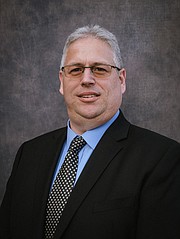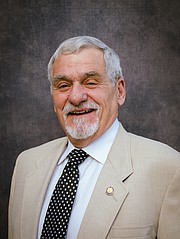NORTH IDAHO ASSETS: Board governance - NIC trustees
All North Idaho College trustees - Todd Banducci, Pete Broschet, John Goedde, Greg McKenzie and David Wold - were asked to submit answers to the same set of questions for a section of a new Hagadone News Network publication called North Idaho: Our People, Our Assets.
Wold's answers were incorporated into a section about NIC trustee governance that appears in the publication. That section is repeated below and followed by the answers submitted by Broschet, Goedde and McKenzie. Todd Banducci did not participate.
The content of the three trustees' answers are their words and writing. Their answers have not been edited at all.
NIC trustee governance
David Wold has been chairman of the North Idaho College Board of Trustees since last spring, when he was appointed by the Idaho State Board of Education to fill a vacancy left by a trustee resignation.
NIC’s most significant value to the community, according to Wold, are in the college’s educational, economic and cultural contributions, which help make the region a great place to live and raise a family.
North Idaho College is governed by a five-member board, elected at large from within Kootenai County. It is a taxing district funded by local property taxes, state funds and student tuition and fees.
“College trustees make policy and the president carries out those policies, answering to the board,” Wold said.
He believes NIC will continue to serve as an anchor in the North Idaho community.
“My service will have been too short to have a legacy but I will remember standing up to serve when needed,” Wold said.
He is not seeking election to the position on Nov. 8.
-Excerpt from North Idaho: Our People, Our Assets
NIC trustees - Questions and Answers
Trustee Pete Broschet
What, in your opinion, is NIC’s most significant value to the community?
In one word “Access”. NIC provides an opportunity to access various postsecondary educational offerings. These opportunities include a two-year transfer degree, dual credit, career technical education, adult basic education, and workforce training. Through these educational opportunities NIC contributes to ensuring a strong, skilled, educated workforce. The economic impact is another positive value to the community and region. Art on the Green, and Summer Theatre are two great examples of how the college provides cultural activities for the entire community. Collegiate sports allow many students to compete after high school while providing entertainment for the fans. The NIC foundation and student financial aid assist numerous students in helping them be able to pursue their educational goals.
How has the board enhanced NIC’s ability to achieve its strategic goals and objectives to:
Ensuring affordable student access, completion, and transfer.
The NIC board of trustees sets the tuition and fees for the college. The board has consistently been conservative in the dollar amounts charged to students. The board is responsible for approving new educational programs. These programs are designed to meet the emerging industries and student demands in the community. Numerous programs have been adopted by the Board to support student success through completion or transfer. The TRIO academic assistance program is just one example.
Investing in people, processes, and places.
NIC takes pride in the quality of faculty and staff that they hire. The Board consistently compensates employees based upon the recommended salary increases approved by the state legislature and governor. The Board of Trustees incorporates reports from students, faculty, and staff during each board of trustees meeting. The Board strategically invests in facilities to support academic programs and technical training. The recent remodel of the Meyer Health Sciences building, which provides additional lab and classroom space for highly specialized training, is just one example. Other examples are the Parker Technical Center, which is a world class facility dedicated to trades and industry and the DeArmond Building.
Engaging with the community and workforce partners.
An NIC Board member sits on the KTEC board which provides Career Technical programs for the three county school districts. The NIC board members are very supportive of the various program advisory committees and may seek their advice when making budgetary and programmatic decisions. NIC Trustees for years have demonstrated their support for workforce training.
What is your philosophy regarding community college governance vs. management?
The Board, by state statute and board policy, has specific roles and responsibilities related to governance that are clearly defined. Rarely should the Board get involved in the day-to-day management of the college. An important Board responsibility is to work with the President and Administrative Team to set the goals and vision for the college.
What, in your mind, will NIC look like in 10 years, and how will this reflect your legacy?
For 88 years NIC has been a college of excellence serving the students of Idaho. Growth, innovation, and responsiveness have always been priorities of the college. Addressing the immediate needs related to accreditation and the governance of the college must be done for the college to move forward. In 10 years, NIC will be a hub for innovation. Our Native American Programs and Veterans' programs will be models for the the State, the college will have full enrollment and strong connection with area employers. NIC will support our increasing population, including the growing aging population, with additional state-of-the-art medical training programs that ensure our hospitals have highly trained medical personnel. The Cybersecurity programs and drone technologyprograms will ensure our students can compete for jobs worldwide. The Board, working together with the faculty, staff, administration, and community will ensure the college remains flexible and continues to provide access to all, should be the legacy of all college trustees.
Trustee John Goedde
What, in your opinion, is NIC’s most significant value to the community?
North Idaho College offers our community education in five distinct areas. First, it allows area students an inexpensive pathway for pursuing a college degree after high school. Dual credit funding coordinated with our area high schools provides a significant value to local families whether kids are considering a trade or college credit. Next, is its role in advanced career technical education; providing an avenue for training in skills that will support them in the future. Workforce training programs are designed to train workers for specific positions in area businesses. Fourth, NIC administers the local GED program for students without a high school diploma. Finally, it provides for classes that our citizens want just for the pure joy of learning such as photography and dance. NIC offers opportunities for every age and stage in the community.
How has the board enhanced NIC’s ability to achieve its strategic goals and objectives to:
Ensuring affordable student access, completion, and transfer.
Investing in people, processes, and places.
Engaging with the community and workforce partners.
The Board of Trustees helps set the strategic direction of our community’s college. We have general oversight including budgetary responsibilities, but day to day management is the role of the president. As a Board, we want to preserve access to an affordable, local, quality education. Trustees adopt programs geared for college credit or advanced technical training needed for a career. The Board responds to the needs of local business owners by creating space that serves the regional needs of our students and our industries. I’m proud of the work put into dual credit programming and opportunities like the Parker Workforce Training Center. It is critical for the Board to continue NIC’s success by addressing accreditation concerns head on. The Board can help assure the community their investment in education is sound. The Board has helped make this happen by following the recommendations of the NWCCU. We have a full board. We are filling positions. Most importantly, we have hired a permanent president to right the ship. We must keep up the progress of the College or we will lose it.
What is your philosophy regarding community college governance vs. management?
As indicated above, day to day management of our college lies with the president who is hired and given direction by the Board of Trustees. Trustees have the responsibility to make sure that directions are accomplished.
What, in your mind, will NIC look like in 10 years, and how will this reflect your legacy?
This question is one that keeps me up at night and the answer depends entirely on the voters. NIC is stabilized and ready for success. Yet, two trustees serve on a local political action committee whose chairman also chairs the Idaho Freedom Foundation, a dark money nonprofit group with an anti-education agenda. They have collectively vowed to take government out of education. If this crazy idea is taken to an extreme, as planned, North Idaho College would cease to exist. The loss of our community college would send an economic tsunami through North Idaho, devastating business and our workforce. One easy example is our nursing program; our local healthcare sector cannot fill critical positions to serve our community. Healthcare workers are needed and the community looks to NIC as a source for new staff. My time as a Trustee will be short but, in that time, we have given the college a new president that, with community support, will make sure the college lives long and remains a pillar in education.
Trustee Greg McKenzie
What, in your opinion, is NIC’s most significant value to the community?
Providing students with a quality, practical education. Students should graduate with real world life skills. Ensuring minds are exposed to controversial real-life situations and help aspirers discover what is true no-matter the “current woke trend”.
How has the board enhanced NIC’s ability to achieve its strategic goals and objectives to:
Ensuring affordable student access, completion, and transfer.
Investing in people, processes, and places.
Engaging with the community and workforce partners.
Stopped the nonsense of pointless mandates, reduced administration bloat.
The board influences the direction of the college through policy. It is the president’s job to apply the policy. Former administrators have allowed North Idaho College to become a place that a previous Trustee Ron Nilson described as “For the last eight years, I have watched a system that says: If you are not with us, you are against us. If you are against us, we will attack you and discredit your character”
It is my goal to have the board and the administration work in harmony.
What is your philosophy regarding community college governance vs. management?
Governance sets the policy and management provides the daily operation. With the former Interim President Sebaaly, North Idaho College finally had a president who interpreted college policies to respect everyone. Dr. Sebaaly did his thesis on Board Governance and that was exactly what the accreditation agency, wanted us to do. Dr. Sebaaly was in the process of fixing NIC's issues and it is unfortunate the newly SBOE appointed board did not allow him to complete this important work. The accreditation agency found Dr. Sebaaly’s management skills impressive and found his administration fully in compliance. I look forward to working with my fellow Trustees to demonstrate how well we can all work together.
What, in your mind, will NIC look like in 10 years, and how will this reflect your legacy?
Our legacy is our children and I want NIC to be a place to be a place we ALL want to send our children and aspiring learners because of its excellence. We can do this by returning North Idaho college back to the community. It is a community college after all.







